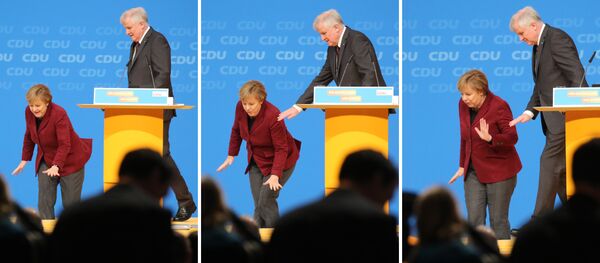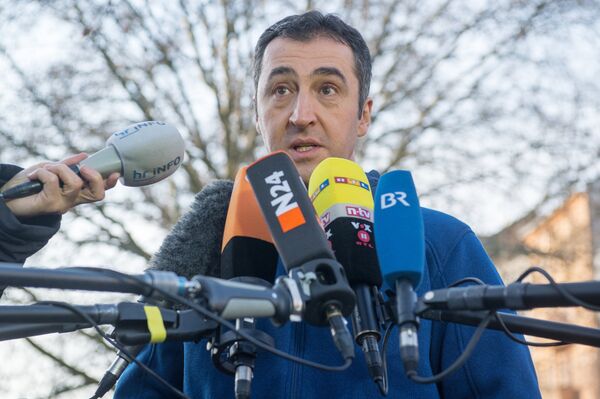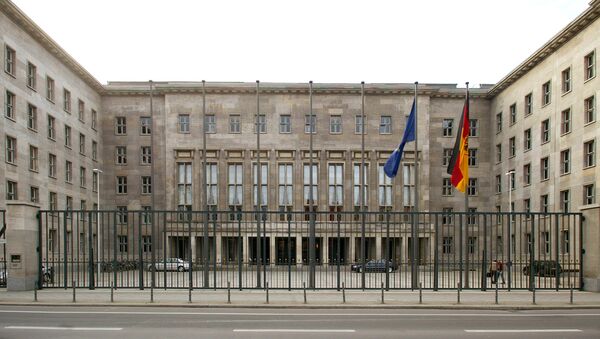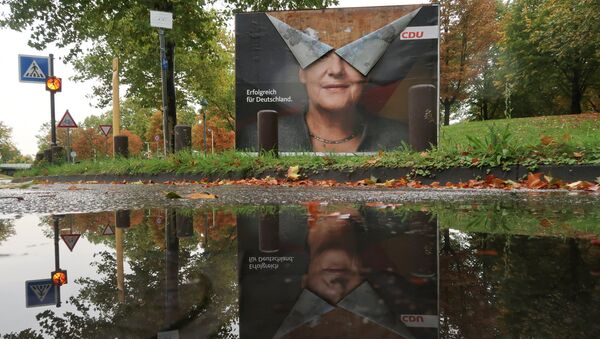Although Angela Merkel's center-right parliamentary bloc got the most votes (32.9%) in last month's elections, the party's worst result since 1949 has left it searching for coalition partners in order to govern.
In the last parliament, Merkel formed a so-called "grand coalition" with the Social Democrats, but after suffering its worst-ever election result on September 24, taking just 20.5% of the vote, the SPD announced that this time around it will be in opposition to the government.
As a result, Merkel's only chance of forming a coalition lies in negotiations with the classically liberal Free Democratic Party (FDP) and the Greens, which came in fourth and sixth place respectively.
The Eurosceptic, anti-immigration Alternative for Germany, which came third with 12.6% of the vote, and the leftist Die Linke, which came fifth with 9.2%, have ruled themselves out of coalition talks.

On Friday, the parties held the first round of joint talks on the formation of a coalition government. They had spent the last week holding talks among themselves as a warm-up to Friday's discussion, but they have some major policy differences to surmount, Sputnik Deutschland reports.
Migration and Asylum
The Bavarian sister party to Merkel's Christian Democratic Union (CDU), the Christian Social Union (CSU), is led by Horst Seehofer. He has repeatedly demanded limiting the number of refugees entering Germany to 200,000 per year, a demand rejected by Merkel on the grounds that it isn't "practical."

These policies are opposed by the Greens, whose leader Simone Peter declared, "We will not participate in policies that deprive people of their rights."
The Greens, as well as the FPD, want to create more legal certainty around immigration with a comprehensive migration law. FPD politician Joachim Stamp called it "one of the most important projects for a potential Jamaica coalition," but Merkel's Union instead proposes a "skilled employees immigration law," with a focus on immigration by migrants with skills required in Germany.
Defense and Foreign Policy
During the election campaign, the CDU/CSU was in favor of increasing defense expenditure from the current 1.2% of GDP to 2%, in line with the NATO target.
The FPD has called for 3% of GDP to be spent on arms, diplomacy and development aid. The Greens are against increasing defense spending and prefer money to be spent on development aid.
During pre-election campaigning, the Greens had called for the government to maintain sanctions against Russia and even strengthened. However, the FDP has criticized the sanctions and called for dialogue with Moscow instead.
"Sanctions only make sense when they work. If you know that the other side is more or less coping with them, sanctions are nonsense," deputy FDP chairman Wolfgang Kubicki said.

"He wouldn't be able to go anywhere else. Not to the US because he considers Trump to be a disgrace, and not to Turkey because of Erdogan," Kubicki, who is also a candidate for a ministerial post in a Jamaica coalition, said of Ozdemir.
Transport and Agriculture
The Greens propose to ban fossil fuel-emitting cars from 2030 onwards, a proposal which is unpopular with the Bavaria-based CSU, where BMW and Audi plants are located. Angela Merkel is ready to discuss the issue but doesn't want to commit to a concrete target, while the FDP Lindner says that the Greens' 2030 target is "economically harmful, ecologically unnecessary and practically impossible."

The CDU/CSU say that animal welfare is an important concern, but measures should be "practicable." The FDP wants to improve livestock farming by means of targeted agricultural investment subsidies, but argues against "rigid" regulatory requirements.
Taxation
The Greens are in favor of a property tax and an increase in the top rate of tax, which the CDU/CSU and FDP categorically oppose. Generally, the FDP does not want to increase taxes and instead proposes tax relief for higher earners.
The last time the FDP was in government, its tax cutting plans were vetoed by Finance Minister Wolfgang Schaeuble of the CDU.
In the week prior to the election, FDP leader Christian Lindner described the position of finance minister as the only one approaching the power of the Chancellery, leading to speculation that the party would make the finance ministry a condition of any prospective coalition arrangement.
Last month it was reported that Merkel had asked Schaeuble to become President of the Bundestag, which would potentially make way for a politician from another party.

The CDU/CSU wants a gradual, 11-step abolition of the tax between 2020 and 2030, but the FDP wants to abolish the so-called "Soli," which, by the end of 2019.
The Greens want to implement other levies to replace some of the annual €17 billion ($20 billion) raised by the solidarity surcharge, but FDP leader Lindner has the backing of the CSU when he insists that the tax must be abolished "without money being pulled out of the purse elsewhere."


